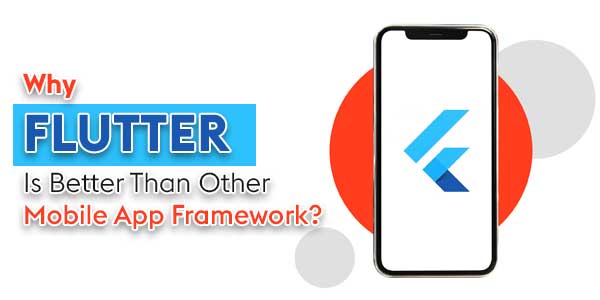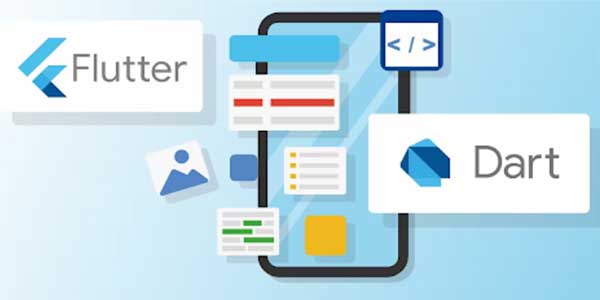
Flutter is primarily a mobile app framework developed by Google. It allows developers to create high-quality native interfaces for both iOS and Android using a single codebase. Flutter uses Dart as its programming language, which is optimized for building mobile and web applications.
Flutter’s core focus is on providing a fast and efficient development experience, enabling developers to build beautiful and performant apps. By using Flutter, developers can write code once and deploy it on multiple platforms, eliminating the need for separate codebases for iOS and Android. This code-sharing capability helps reduce development time, effort, and maintenance costs.
While Flutter excels in mobile app development, it also offers support for building web and desktop applications through the Flutter for Web and Flutter for Desktop projects. This expansion allows developers to leverage their existing Flutter skills to create multi-platform experiences.
In summary, Flutter is primarily a mobile app framework, but it also provides support for building web and desktop applications, making it a versatile tool for cross-platform development.
Since its initial release in 2017, Flutter has gained popularity among developers and has been adopted by numerous organizations for mobile app development. Some well-known companies that have utilized Flutter for their apps include Google, Alibaba, Tencent, BMW, Square, and many others.
The Flutter community has grown rapidly, and various reports and surveys have indicated its increasing adoption. Google actively supports and promotes Flutter, and its ecosystem has expanded with the availability of numerous packages, libraries, and resources.
Table of Contents
Reasons Why Flutter Is The Best Hybrid Mobile Framework Then Others:
Flutter is often considered to be fast compared to other mobile app frameworks for several reasons:
- UI Rendering Performance: Flutter uses a unique rendering engine called Skia, which allows it to directly render UI components without relying on native controls. This eliminates the performance overhead associated with bridging between the app’s code and the underlying platform. Flutter’s rendering engine enables high-performance graphics and smooth animations, resulting in a fast and responsive user interface.
- Hot Reload: Flutter’s hot reload feature allows developers to instantly see the changes they make to the code without having to restart the app or lose the current state. This rapid feedback loop significantly speeds up the development process and allows for quicker iterations, leading to faster overall development.
- Dart Programming Language: Flutter uses Dart as its programming language. Dart is optimized for performance and is compiled to native code, which helps in reducing the execution time and improving the app’s speed. Additionally, Dart employs a just-in-time (JIT) compiler during development, which further enhances the development experience by providing fast iteration times.
- Widget-based Architecture: Flutter follows a reactive and widget-based architecture, where the UI is composed of widgets that are lightweight and customizable. Flutter’s widgets are designed to be highly efficient and allow for efficient updates and minimal rebuilding of the UI. This approach reduces unnecessary UI redraws and enhances performance.
- Cross-platform Efficiency: Flutter enables developers to build apps for multiple platforms, including iOS, Android, web, and desktop, using a single codebase. By sharing a common codebase, developers can leverage code reuse, which saves development time and effort. This streamlined development process contributes to faster app development and deployment.
- Native-like Performance: Flutter leverages native platform features and hardware acceleration, enabling it to achieve native-like performance. It provides access to native device APIs and services, allowing developers to build apps with rich functionality and high performance.
- Growing Community and Ecosystem: Flutter has a rapidly growing and enthusiastic community of developers. The community actively contributes libraries, packages, and plugins that extend the functionality of Flutter. This growing ecosystem provides developers with a wide range of tools and resources, making it easier to build complex and feature-rich applications. The supportive community has helped accelerate the adoption of Flutter and contributed to its rapid growth.
- Google Backing and Support: Flutter is developed and backed by Google, which brings credibility and resources to the framework. Google’s active involvement and support have helped promote Flutter and attract developers to the platform. The strong backing of a tech giant like Google has played a significant role in Flutter’s rapid growth.
- Ease of Learning and Documentation: Flutter offers a straightforward and intuitive development experience, making it relatively easy to learn for developers with varying levels of experience. Flutter’s comprehensive documentation, tutorials, and resources provide a wealth of information for developers to get started quickly and overcome challenges. The ease of learning and availability of learning materials have contributed to Flutter’s fast-growing adoption.
- Open-source. Both Flutter and Dart are open-source and free to use, and provide extensive documentation and community support to help out with any issues you may encounter.

Top Apps Developed With Flutter Framework:
Flutter has been utilized to create numerous successful and popular applications across various industries. While it is challenging to determine the definitive “top” apps developed with Flutter as it depends on various factors such as usage statistics, ratings, and individual preferences, here are a few notable examples:
- Google Ads: Google Ads is an app that helps advertisers manage their Google Ads campaigns. It is built using Flutter and demonstrates the capabilities of the framework while being used by a significant number of advertisers worldwide.
- Alibaba: The Alibaba Group, one of the world’s largest e-commerce companies, has utilized Flutter for multiple apps, including their Xianyu and DingTalk applications.
- Reflectly: Reflectly is a popular journaling app that uses Flutter. It offers a visually appealing and user-friendly interface, providing users with a digital platform to document their thoughts and emotions.
- Hamilton: The Official App: The official app of the renowned musical “Hamilton” was developed using Flutter. It offers fans access to exclusive content, ticket purchases, and interactive features related to the musical.
- Realtor.com: Realtor.com, a leading real estate website, utilized Flutter to create its mobile app. It provides users with an extensive database of real estate listings, property information, and tools for buying, selling, or renting properties.
- Hookle: Hookle is a social media management app that enables small business owners to manage multiple social media accounts simultaneously. It allows scheduling, content creation, and monitoring of social media activities in one place, all developed with Flutter.
Last Words:
These are just a few examples of apps developed with Flutter, and there are numerous other successful applications that have been built using the framework. Flutter’s versatility, performance, and cross-platform capabilities have made it an appealing choice for a wide range of app developers and organizations.
In summary, Flutter’s combination of features such as hot reloading, cross-platform development, native-like performance, a thriving community, Google’s backing, and ease of learning has fueled its rapid growth as a mobile app framework. These factors have attracted developers looking for efficient, productive, and powerful tools for building high-quality mobile applications.
While Flutter offers impressive performance, it’s important to note that the performance of any mobile app framework also depends on various factors such as the complexity of the app, the efficiency of the code, and the developer’s expertise. However, Flutter’s architectural choices and optimizations make it a popular choice for developing high-performance mobile applications.












Be the first to write a comment.